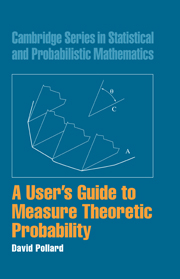Book contents
- Frontmatter
- Contents
- PREFACE
- CHAPTER 1 MOTIVATION
- CHAPTER 2 A MODICUM OF MEASURE THEORY
- CHAPTER 3 DENSITIES AND DERIVATIVES
- CHAPTER 4 PRODUCT SPACES AND INDEPENDENCE
- CHAPTER 5 CONDITIONING
- CHAPTER 6 MARTINGALE ET AL.
- CHAPTER 7 CONVERGENCE IN DISTRIBUTION
- CHAPTER 8 FOURIER TRANSFORMS
- CHAPTER 9 BROWNIAN MOTION
- CHAPTER 10 REPRESENTATIONS AND COUPLINGS
- CHAPTER 11 EXPONENTIAL TAILS AND THE LAW OF THE ITERATED LOGARITHM
- CHAPTER 12 MULTIVARIATE NORMAL DISTRIBUTIONS
- APPENDIX A MEASURES AND INTEGRALS
- APPENDIX B HILBERT SPACES
- APPENDIX C CONVEXITY
- APPENDIX D BINOMIAL AND NORMAL DISTRIBUTIONS
- APPENDIX E MARTINGALES IN CONTINUOUS TIME
- APPENDIX F DISINTEGRATION OF MEASURES
- INDEX
CHAPTER 4 - PRODUCT SPACES AND INDEPENDENCE
Published online by Cambridge University Press: 29 March 2011
- Frontmatter
- Contents
- PREFACE
- CHAPTER 1 MOTIVATION
- CHAPTER 2 A MODICUM OF MEASURE THEORY
- CHAPTER 3 DENSITIES AND DERIVATIVES
- CHAPTER 4 PRODUCT SPACES AND INDEPENDENCE
- CHAPTER 5 CONDITIONING
- CHAPTER 6 MARTINGALE ET AL.
- CHAPTER 7 CONVERGENCE IN DISTRIBUTION
- CHAPTER 8 FOURIER TRANSFORMS
- CHAPTER 9 BROWNIAN MOTION
- CHAPTER 10 REPRESENTATIONS AND COUPLINGS
- CHAPTER 11 EXPONENTIAL TAILS AND THE LAW OF THE ITERATED LOGARITHM
- CHAPTER 12 MULTIVARIATE NORMAL DISTRIBUTIONS
- APPENDIX A MEASURES AND INTEGRALS
- APPENDIX B HILBERT SPACES
- APPENDIX C CONVEXITY
- APPENDIX D BINOMIAL AND NORMAL DISTRIBUTIONS
- APPENDIX E MARTINGALES IN CONTINUOUS TIME
- APPENDIX F DISINTEGRATION OF MEASURES
- INDEX
Summary
SECTION 1 introduces independence as a property that justifies some sort of factorization of probabilities or expectations. A key factorization Theorem is stated, with proof deferred to the next Section, as motivation for the measure theoretic approach. The Theorem is illustrated by a derivation of a simple form of the strong law of large numbers, under an assumption of bounded fourth moments.
SECTION 2 formally defines independence as a property of sigma-fields. The key Theorem from Section 1 is used as motivation for the introduction of a few standard techniques for dealing with independence. Product sigma-fields are defined.
SECTION 3 describes a method for constructing measures on product spaces, starting from a family of kernels.
SECTION 4 specializes the results from Section 3 to define product measures. The Tonelli and Fubini theorems are deduced. Several important applications are presented.
SECTION *5 discusses some difficulties encountered in extending the results of Sections 3 and 4 when the measures are not sigma-finite.
SECTION 6 introduces a blocking technique to refine the proof of the strong law of large numbers from Section 1, to get a version that requires only a second moment condition.
SECTION *7 introduces a truncation technique to further refine the proof of the strong law of large numbers, to get a version that requires only a first moment condition for identically distributed summands.
SECTION *8 discusses the construction of probability measures on products of countably many spaces.
- Type
- Chapter
- Information
- A User's Guide to Measure Theoretic Probability , pp. 77 - 110Publisher: Cambridge University PressPrint publication year: 2001

